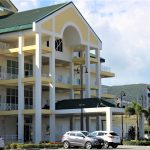Government to collect tax from guests booking via AirBnB

“No additional laws are required to collect taxes related to Airbnb, those taxes can be collected under the current tax system,” said Finance Minister Ardwell Irion during the 2023 budget debate in Parliament, last week. New on the budget is projected income from tax on Airbnb stay to the tune of NAf 5 million.
There are an estimated 440 units on Dutch St. Maarten listed on Airbnb and Vacation Rentals by Owners (VRBO), two online marketplaces for lodging and homestay rentals. Minister Irion said he is following the advice of the Board of Financial Supervision CFT to have a projected revenue of 5 percent tax on Airbnb rentals listed on the 2023 budget of government.
The last published number of nights spent in Airbnb and VRBO listed units on St. Maarten is 6,200, in 2018. That same year a motion was passed in Parliament regarding collection of 5 percent room tax from Airbnb and VRBO, with 9 Members of Parliament being in favor and 4 against.
Parliament considered that “Government is potentially not collecting millions of guilders at this moment in unpaid room tax” and that “the hotel industry has long called for leveling of the playing field” with the online competitors. It was brought to the attention of the public that the tax reforms that were in the works by the Ministry of Finance as presented to Parliament did not include plans to address the Airbnb and VRBO tax compliance.
 When Irion took office on March 28, 2020, he rekindled the process of reaching an agreement with Airbnb to collect the room tax on behalf of Government, he told the Finance Committee of Parliament the following year. “Airbnb will collect the taxes on behalf of government and Airbnb, on a quarterly basis, will pay us the lump sum of taxes,” the Minister told the Committee Members of Parliament, explaining that it was impossible for government to search for every rental unit listed on the online platform. “We don’t have the capacity or resources to do that and I believe that it is also inefficient,” Irion said.
When Irion took office on March 28, 2020, he rekindled the process of reaching an agreement with Airbnb to collect the room tax on behalf of Government, he told the Finance Committee of Parliament the following year. “Airbnb will collect the taxes on behalf of government and Airbnb, on a quarterly basis, will pay us the lump sum of taxes,” the Minister told the Committee Members of Parliament, explaining that it was impossible for government to search for every rental unit listed on the online platform. “We don’t have the capacity or resources to do that and I believe that it is also inefficient,” Irion said.
The announced agreement is still pending. In a November 28, 2022, letter to Minister Irion, the CFT stated that “in the short term, a reform of the (ordinance on) room tax, including the collection via Airbnb, should be introduced.” Currently it is still not possible to have third parties collect tax on behalf of the Government of St. Maarten.
 “There is a big misconception right now on what the CFT is saying and what this government has put in the budget,” said Party for Progress (PFP) member of Parliament Raeyhon Peterson during the 2023 budget debate. “We asked the Ministers what was the legal basis for this budget post, and their answer was that the CFT said in their advice that this number needed to be reflected in the budget. But that’s not what the CFT says.”
“There is a big misconception right now on what the CFT is saying and what this government has put in the budget,” said Party for Progress (PFP) member of Parliament Raeyhon Peterson during the 2023 budget debate. “We asked the Ministers what was the legal basis for this budget post, and their answer was that the CFT said in their advice that this number needed to be reflected in the budget. But that’s not what the CFT says.”
The CFT did not indicate to government to put the anticipated numbers in the budget, Peterson said. “That’s where this government is misunderstanding. They had to present these laws to Parliament, prior to putting anything in the budget. The Council of Advice also goes in on this aspect specifically, and they speak of a “gebrek aan vastgestelde wettelijke heffingsgrondslagen” (lack of established legal tax bases).”
United People Party leader and Member of Parliament Rolando Brison, however, is convinced that the Landsverordening regelende de heffing en invordering van een logeergastenbelasting (National Ordinance for the levying and collection of a guest tax) allows for the collection of 5 percent tax from people renting via Airbnb and VRBO. MP Brison referred to Article 1 of the Ordinance, which states that “a direct tax is levied under the name “guest tax” with regard to staying in hotels, guest houses, pensions, apartments, houses or other buildings suitable for accommodation against payment in any form whatsoever by persons who are not included in the basic administration of St. Maarten.”
 According to MP Brison, government needs to start “sending letters to these units” and start “an educational program informing people (tourists) that they have to be tax compliant”. Equal to the government tax of 5 percent added to a hotel bill, the proof of payment for accommodation in a privately owned unit must also include the 5 percent, Brison said. “It is not a legal issue what you see in this budget, what you are seeing is a compliance effort.”
According to MP Brison, government needs to start “sending letters to these units” and start “an educational program informing people (tourists) that they have to be tax compliant”. Equal to the government tax of 5 percent added to a hotel bill, the proof of payment for accommodation in a privately owned unit must also include the 5 percent, Brison said. “It is not a legal issue what you see in this budget, what you are seeing is a compliance effort.”
The MP does acknowledge that an amendment of the law is needed for Airbnb and VRBO to collect taxes on behalf of the Government of St. Maarten. “We have to write a legal clause that allows us to write tax collection agreements for the hotel tax directly with these websites like Expedia, Booking.com and also with Airbnb,” Brison said. “That would require some additional legislation to go into the tax collection agreement. But you don’t need that in order to collect, it would just make it easier to collect.”
Brison wants to see another amendment to the current tax system. “The room tax must be raised,” he said. “We have the lowest hotel tax in the entire Caribbean. While the Caribbean average is 12 percent, we charge only 5 percent.” The MP proposes an increase of the St. Maarten room tax to Caribbean standard, which requires parliamentary approval.
###
Related articles:
Generous travel allowances for ministers on a cut 2023 budget


























